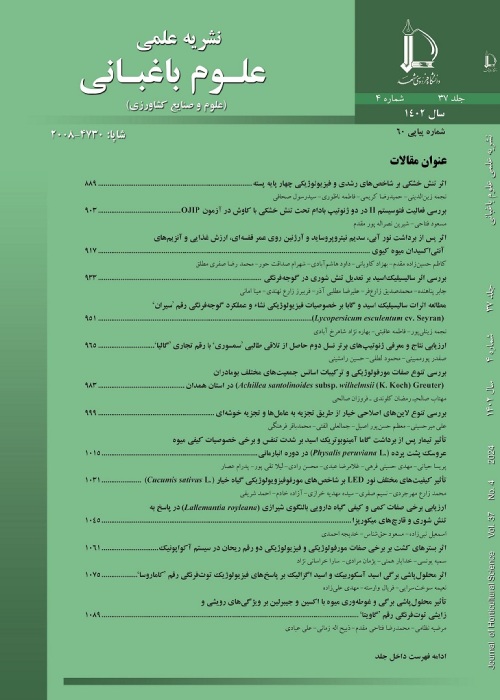The Evaluation of Growth, Yield and Physiological Responses of African Horned Cucumber (Cucumis metuliferus L.) to Deficit Irrigation
Water stress is the most prominent abiotic stress limiting agricultural crop growth and productivity. Deficit irrigation stress as a consequence of the progressive decrease in water availability has been a hot topic regarding food security during the last two decades. Growth and development of plants is influenced by reduction in turgor that results in decreased nutrient acquisition from dry soil. When water supply is limited, plant growth and yield is reduced and plant structure is modified by decreasing in leaf size. The effect of deficit irrigation on fruit yield and quality has been reported by numerous researchers with different results. In melon, deficit irrigation reduced marketable fruit number and yield, average fruit weight, fruit diameter and did not affect rind thickness and seed cavity, but increased total soluble solids content. Although the effects of water stress have been studied on growth and yield of different crops during the last years, recent information on the response of African horned cucumber yield and quality to deficit irrigation remains limited, particularly about the results of restricted water distributions in arid and sub-arid environments. The main goal of this study was to evaluate the effect of controlled deficit irrigation on growth, physiological parameters and yield and fruit quality of African horned cucumber.
Field experiment was performed based on a completely randomized block design with three irrigation regimes (60, 80 and 100 %ETc), whit three replications at Research Farm of University of Zanjan during the 2019. The African horned cucumber seeds were sown on 1th July 2020 at recommended spacing of 50 cm in row with 120 cm between rows. The irrigation system consisted of one drip line every crop row. The three irrigation levels were calculated based on actual evapotranspiration (ETc): (1) control, irrigated 100% crop water requirement, (2) deficit irrigation 80% ETc and (3) deficit irrigation 60% ETc. The Water requirement of the plant for control treatment was estimated using long-term average daily data of meteorological parameters recorded at Zanjan Meteorological Station and following relation. Before starting the differential irrigation at five-leaf stage, all treatments were supplied with similar amount of water to maximize stands and uniform crop establishment. During plant growth, the relative water content, proline content, electrolyte leakage, chlorophyll and carotenoids, P and K contents were measured. After fruit harvest, vine length of each plant, leaf dry weight and stem diameter were measured. The fruits were harvested when color changed from green to yellow. Fruit weight, fruit number per plant and fruit yield per plant was measured. Immediately after harvest, fruit firmness, total soluble solid, total phenols content, antioxidant capacity and vitamin C were determined.
As the results showed water deficit stress significantly reduced plant length, chlorophyll content, and increased carotenoids content. Based on the findings, deficit irrigation caused a significant reduction in leaf relative water content. According to the results, phosphorus and potassium contents in African horned cucumber leaves decreased with deficit irrigation treatments. The highest P and K contents were found under irrigation 100 %ETc treatment. Drought stress and associated reduction in soil moisture can decrease plant nutrient uptake by reducing nutrient supply through mineralization. The proline content increased with the deficit irrigation treatments; in particular with sever deficit irrigation (60 %ETc). Mean comparisons of data showed that deficit irrigation led to a significant increase in electrolyte leakage compared to control.Water deficit stress caused significant reductions in yield. The highest fruit number per plant and yield were obtained under irrigation 100% ETc. The average fruit weigh significantly increased in response to increase water deficit stress. Deficit irrigation treatments significantly decreased vitamin C and fruit firmness. Significant differences among irrigation treatments were observed for total phenols and total soluble solid contents. The phenols and total soluble solid contents increased with the decrease of irrigation water applied. Antioxidant capacity was affected significantly by the irrigation treatments, and water deficit stress increased antioxidant capacity, which no significant difference was observed between irrigation 100 and 80 %ETc.
Water deficit has been shown to adversely affect plant growth, fruit yield, and leaf water status of African horned cucumber, but led to increase the TSS and antioxidant capacity. According to the results, fruit yield reduced 13.9 % under irrigation 80% ETc compared to irrigation 100% ETc, However, water consumption was saved by 20% and improved fruit weight and fruit quality with increasing soluble solids and antioxidant capacity.
- حق عضویت دریافتی صرف حمایت از نشریات عضو و نگهداری، تکمیل و توسعه مگیران میشود.
- پرداخت حق اشتراک و دانلود مقالات اجازه بازنشر آن در سایر رسانههای چاپی و دیجیتال را به کاربر نمیدهد.




